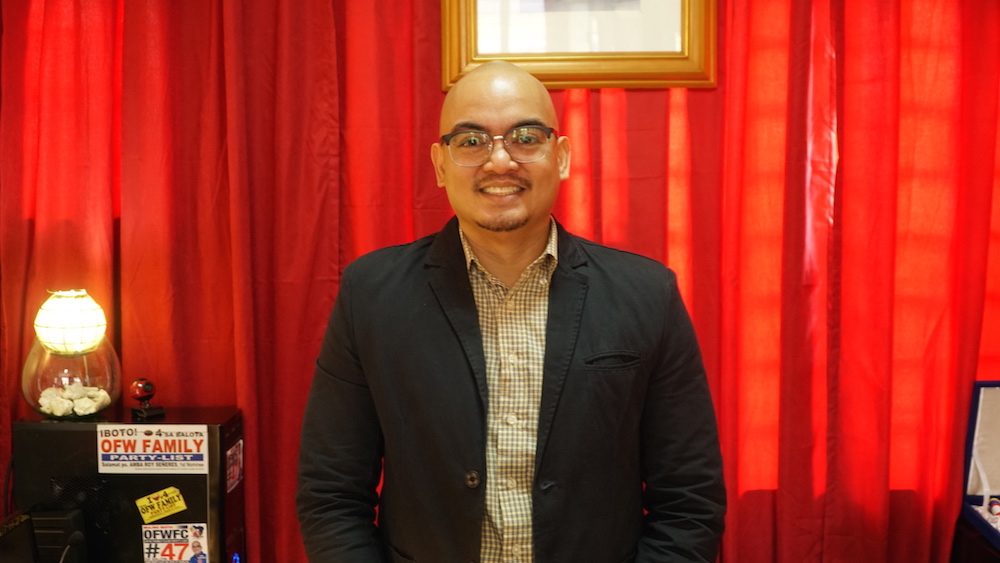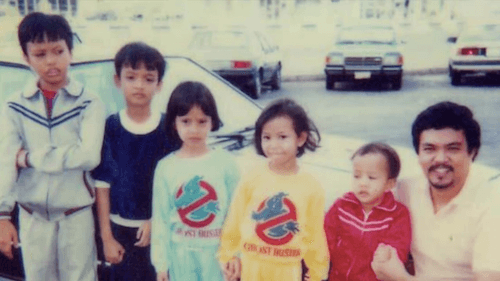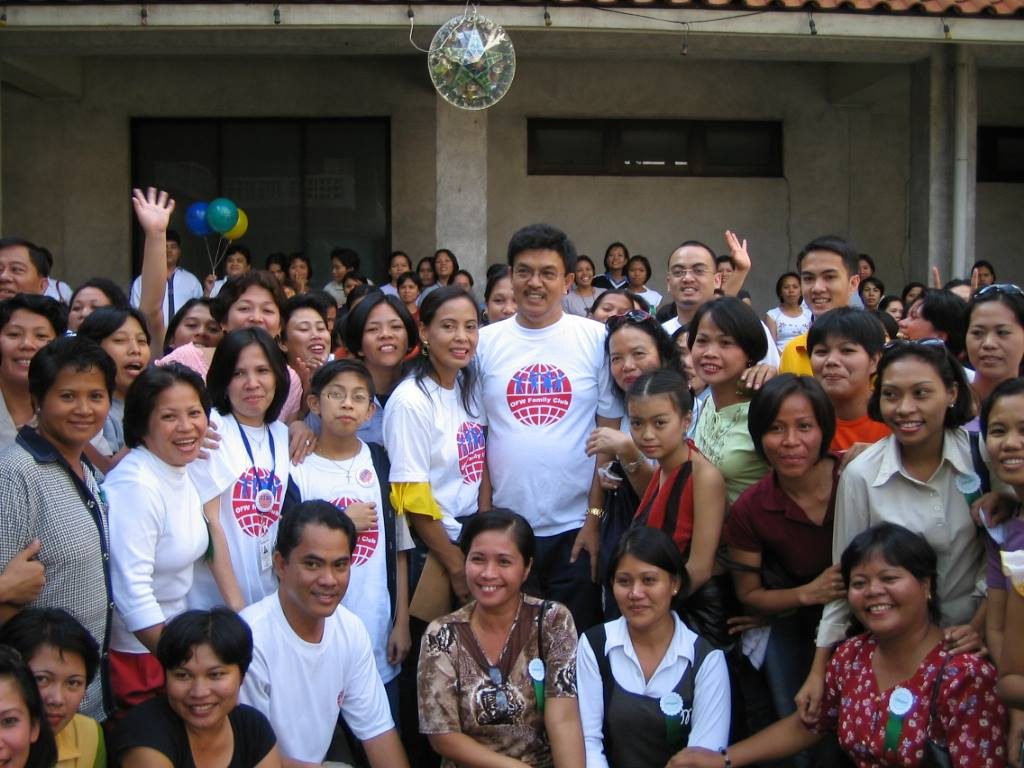SUMMARY
This is AI generated summarization, which may have errors. For context, always refer to the full article.

MANILA, Philippines – It was just an ordinary day for 11-year-old Roy Señeres Jr – known by his friends as RJ – when their doorbell suddenly rang.
They lived then in the same building as the Philippine Embassy in Abu Dhabi, where his dad, Roy Señeres Sr, worked as labor attachè in the 80s.
As always, the young RJ ran to open the door. A Filipino woman who looked younger than his mother stood in front of him. One of her eyes was bruised, he noticed.
His dad came and welcomed her into their house. “Pasok dito, pasok dito,” he heard him say (Come in, come in). Later in the day, they learned that the woman was an overseas Filipino worker (OFW), punched in the face by her “madame” (the term they used to refer to their female employers).
A normal kid would have panicked or shown curiosity as to why the woman’s eye was bruised. Or he could have asked himself why his father would so easily let a complete stranger into their house as if she was a friend they could trust.
But it was nothing new for RJ.
At the time, there was no shelter for distressed OFWs in Abu Dhabi, and so their 3-bedroom apartment served as a refuge for runaway workers.
Their doorbell often rang, and RJ would open the door to see Filipinos still catching their breath, or missing a shoe, or had little clothing, or were not carrying any bag or luggage with them.
It all didn’t make sense to young and naive RJ at first.

His father welcomed these OFWs to their apartment and offered them food, bed, and clothes. Often, their house would be so full of distressed OFWs that RJ had to share his room.
The young RJ didn’t like it. His drawings on the wall were getting torn, and he couldn’t play with his glow in the dark stickers because there’d be 3 to 4 strangers in his small room.
RJ’s father eventually noticed his discomfort. One night, his father sat him down and told him that he planned to ask the government to allow him to rent a new office, a bigger one where RJ and his siblings could play. His old office instead would be turned into a shelter for OFWs, equipped with a social center where they and other OFW children could play as well.
This eventually led to the establishment of the first Overseas Worker Welfare Administration center in the Arab city.
RJ was too young to understand his father’s adult jargons. “What’s a department of labor? What does ‘rent’ mean?” he asked himself.
But there’s one line from his father that struck RJ the most.
“Let’s thank God na ang nagdo-doorbell sa pintuan natin ay hindi si mommy mo, o si Hannah, o si Hazel (Let’s thank God that it’s not your mom, or Hannah, or Hazel who’s ringing the doorbell),” his father said. Hannah and Hazel are his sisters.
After months of opening the door for distressed OFWs, RJ finally understood what his father meant. For the first time in months, he realized how trivial his problems were compared to the problems of the visitors he had been sharing his room with.
RJ’s rhyme
Growing up in this environment, one would think RJ would want to follow the path his father took. But instead, RJ went on to pursue a career in music.
RJ studied high school in the US, when his father was assigned as labor attachè for the Philippine Embassy in Washington, DC.
It was there where he was exposed by his African-American friends to hip-hop music.
When RJ went back to the Philippines for college, he brought with him a love for hip-hop music, as well as what he called a “hip-hop culture and attitude.”
He eventually met friends with the same passion, and in 1995, they formed the hip-hop group Sun Valley Crew (SVC).
Together, SVC did well in the local music industry, launching a couple of albums under major labels. Fans of the group know RJ by his stage name, Ill-J.
RJ started his music career at 17, so at the time, his music was mostly about teenage angst, and “independence and becoming your own man.” It was all about the “swag,” he said.
As he grew older, however, RJ’s music evolved. His lyrics became more socially conscious, and he talked more about politics, society, and life in the Philippines.
OFW Family Club
When RJ’s father returned to the country after years of service as labor attachè and ambassador abroad, OFWs and their families often visited him in their house in Las Piñas to ask for help.
Their house was in a cul-de-sac, so they often got in trouble with their village’s homeowners’ association because troves of people would line up outside their gates, waiting for his father.
Upon learning that this was already disturbing their neighbors, their family decided to form an organization. They called it the OFW Family Club, because whole families often came to them for help.
The vision was to create a network of migrant workers, advocates, and ambassadors, who would help those in need and give OFWs a stronger voice.
On June 1, 2000, the OFW Family Club was born.

Helping OFWs
Now on its 18th year, their humble club has grown to more than 2 million card-bearing members all over the world.
Through the organization, the family has helped many OFWs, extending welfare and legal assistance, providing seminars, and guiding them throughout their journey abroad.
RJ shared that they receive distress calls from OFWs every day – especially from domestic workers – and they try their best to help them. One particular case they’ve worked on, for example, was the case of OFW Joseph Urbiztondo.
Urbiztondo was sentenced to 25 years of prison in Kuwait for allegedly taking the life of a Bangladeshi national. Urbiztondo claimed he only defended himself, and that he was made to confess for a crime he didn’t commit.
His case was brought to the attention of RJ’s father while he was serving as a representative in Congress under the OFW Family Party List. At the time, Urbiztondo had already been in jail for 17 years.
With the organization’s help, they were able to find the victim’s next of kin in Bangladesh to negotiate Urbiztondo’s release. After paying blood money and securing a letter of forgiveness from the victim’s son, Urbiztondo was finally freed. He was jailed for 20 years – the longest time an OFW has been jailed abroad.
Passing the torch
But it hasn’t been all rainbows and butterflies for RJ and the OFW Family Club.
RJ’s father decided to run as president in the 2016 presidential elections. Due to his declining health, however, he decided to withdraw his candidacy on February 5, 2016. He died from cardiac arrest days later.

Before his death, RJ’s father already passed on the torch to him and his siblings. He knew that the organization is best left in the hands of his children who grew up surrounded by OFWs.
As his father’s namesake, RJ was chosen and trained to head the organization. They thought that because they shared the same name, the transition would be easier, and that the friends his father made along the way would recognize his name and help out.
But running the club has been difficult without his father, RJ admitted.
“He has been the cornerstone, the guy who was very instrumental in all the dealings of the organization, so now that he is no longer here, it has been very difficult,” he said.
Nonetheless, RJ is determined to keep moving forward. Everyday, he carries with him the promise he made to his father before he died: “Don’t worry, I’ll carry on. I’ll carry on and do what needs to be done, to make that the club founded by you remain steadfast, and to continue the work you’ve started.”
For RJ, the club has already come a long way, but it still has miles to go. He has fresh plans and bigger ambitions.
For one, he wants to unite more OFWs through the organization. He’s also pushing for more ambassadors, attachès, and welfare officers to be deployed.
“Isipin mo, ilang libong mga Pilipino ang umaalis sa bansa, ang labor attaché mo ganoon pa rin – isa, dalawa, tatlo. Ang welfare officer mo ganoon din. So, sa ratio niyan, kita mo talaga, nasasaturate sila doon. So we need to add more,” he said.
(Think about it: thousands of Filipinos leave the country, but the number of labor attachès is still the same – one, two, or three. It’s the same with welfare officers. With that ratio, you see how saturated they are there. We need to add more.)

Carrying the lessons he’s learned from his father, and the passion that grew in him after meeting and helping so many distressed OFWs, RJ is off to start his own journey and bring honor to the name he inherited.
Just like his music, RJ continues to grow and evolve. His father has already set the beat, and now it’s up to RJ to add rhyme and rhythm to the song of his life. – video produced by Marga Deona/Rappler.com
Add a comment
How does this make you feel?
There are no comments yet. Add your comment to start the conversation.